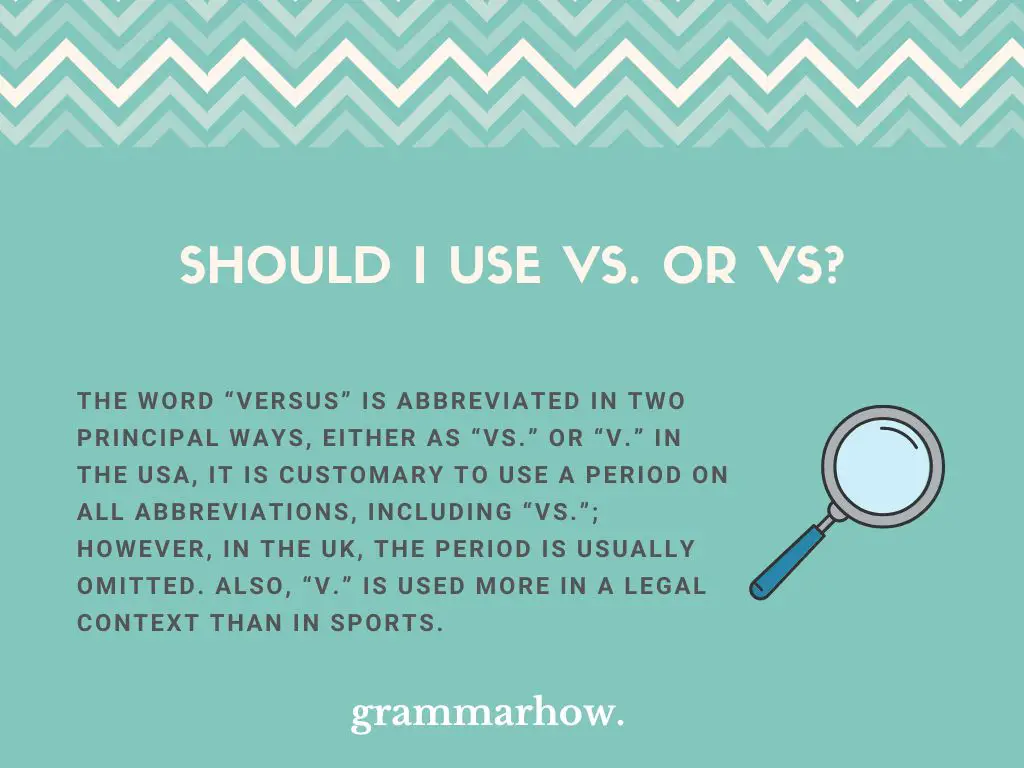You may have seen several abbreviations being used for the word “versus” and doubted which is the correct short form. This page looks at the different ways to abbreviate the word “versus” and shows how the abbreviations are used in context.
Should I Use vs. or vs?
The word “versus” is abbreviated in two principal ways, either as “vs.” or “v.” In the USA, it is customary to use a period on all abbreviations, including “vs.”; however, in the UK, the period is usually omitted. Also, “v.” is used more in a legal context than in sports.

The Cambridge Dictionary states that the word “versus” is used to say that a person or people are competing against others. The most common context in which it is found is when discussing sports or legal cases.
The abbreviation “vs” or “vs.” is most commonly used when discussing sports or competitions of some kind. In contrast, the abbreviation “v” or “v.” are used more in legal documentation to refer to the two parties contesting a legal case.
Vs.
The abbreviation “vs.” is the 2-letter abbreviation for “versus” and is most commonly found when referring to sports or other competitions when two people or teams compete against each other.
The version with the period is most commonly found in the USA, where all abbreviations use a period.
Here are some examples of “vs.” in a sentence:
- This week`s game is Man Utd vs. Liverpool, which kicks off at 3 pm.
- The match was us children vs. the adults, and we lost 3-2.
- In an argument of climate change deniers vs. scientists, the scientists usually win.
Vs
The abbreviation “vs” is exactly the same as “vs.” except the former is more prevalent in British English, and the latter is commonly used in American English.
This abbreviation is used in situations referring to a sport or some type of competition. It is uncommon that you would see the abbreviation “vs” in a legal context, where “v” is preferred.
Here are some examples of “vs” in a sentence:
- As teenagers, it was a case of us vs the world, and unfortunately, we lost and had to adapt to the ways of the world.
- This week`s boxing match is Alverez vs Peacock, which will be shown at 10 pm EST.
- We are looking forward to the World Cup match of England vs Wales.
V.
The abbreviation “v.” with a period or “v” without a period represents the word “versus.” The period is commonly added in North America, where all abbreviations use a period.
In the UK, adding a period is less common, although you will still find that some people do add it.
The abbreviations “v.” and “v” are most commonly used in legal documentation referring to the two parties in a court case. You may also find them used in other situations such as sports or competitions, but it is less likely.
Here are some examples of how the abbreviation “v.” appears in a sentence:
- New anti-abortion laws have bypassed the precedent set by Roe v. Wade in 1973.
- Marbury v. Madison was a groundbreaking case in US legal history.
- The Supreme Court case Brown v. Board of Education set a precedent for equal rights and helped end racial segregation.
Does “vs.” Have a Period?
The abbreviation “vs.” is often used with a period at the end. This practice is more commonly done in the USA, where all abbreviations are typically finished with a period. There is no difference in meaning between the abbreviation with the period and the one without.
The practice is less common in the UK and other English-speaking countries, although you will still encounter it occasionally.
Is the Abbreviation for Versus Capitalized?
The abbreviation for “versus” should not be capitalized in a title because it only has two letters. However, if you write the full version of the word “versus” in a title, you should use a capital letter.
Furthermore, when the term “vs” appears mid-text, it should also appear in lowercase because it is a preposition rather than a proper noun, which means it doesn’t require a capital letter.
Should You Abbreviate Versus?
The word “versus” is commonly abbreviated both in-text and in titles to refer to sports, competitions, and legal cases. For example, when looking at a list of sports fixtures, it is common that all instances of the word “versus” are all abbreviated as a way of saving space on the paper or screen.
In academic writing, it is more uncommon to use the abbreviation for “versus”, but it is not common to use abbreviations at all in academic writing unless there is a good reason for doing so.
Common Usage of Versus Abbreviations
The three occasions you are most likely to see the abbreviation of the word “versus” are when looking at texts relating to sports fixtures, competitions, or legal cases.
The abbreviation “vs.” or “vs” is most likely used for sports and competitions, whereas “v.” or “v” is more common in documentation relating to legal cases.
In formal writing, you should avoid using abbreviations unless absolutely necessary.
Final Thoughts
The word “versus” in a legal context is abbreviated as “v” or “v.”. In contrast, in a sporting or competition context, the more common abbreviation is “vs” or “vs.” There is no difference in meaning between the four terms. However, the versions with periods are more common in the USA.

Martin holds a Master’s degree in Finance and International Business. He has six years of experience in professional communication with clients, executives, and colleagues. Furthermore, he has teaching experience from Aarhus University. Martin has been featured as an expert in communication and teaching on Forbes and Shopify. Read more about Martin here.
